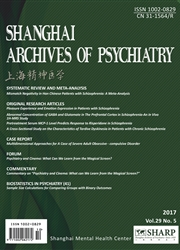

 中文摘要:
中文摘要:
背景以往研究表明精神分裂症患者的神经认知缺损和精神病性症状会导致其职业和社会功能降低。目的评估中国精神分裂症男性住院患者的神经认知和精神病性症状与社会心理功能之间的关系。方法选取上海市精神卫生中心的51例住院男性精神分裂症患者,其中40例患者最终完成了个体和社会功能量表(Personal and Social Performance Scale,PSP)中文版、临床疗效总评量表-病情严重程度量表(Clinical Global Impression-Severity,CGI-S)、阳性和阴性症状量表(Positive and Negative Symptom Scale,PANSS)、字母-数字排序以及香港文字记忆学习测试等项目的评定。结果患者PANSS量表的3个临床分量表的分值和社会功能总体评估(PSP总分和CGI-S分值)之间存在明显负相关。患者的神经认知测定结果与症状或社会功能状况均无关。结论对于急性期住院精神分裂症患者而言,临床症状的严重度—而非神经认知缺损程度,与其社会功能水平密切相关。
 英文摘要:
英文摘要:
Background: Prior research has determined that impairment in neurocognition and psychiatric symptoms contribute to reduced occupational and social functioning in schizophrenia. Objective: Evaluate the relationships of neurocognition, psychiatric symptoms, and psychosocial functioning in male inpatients with schizophrenia in China. Methods: Fifty-one male patients currently hospitalised at the Shanghai Mental Health Center with a diagnosis of schizophrenia were recruited and 40 of them were included in the final analysis. Participants were assessed with Chinese versions of the Personal and Social Performance Scale (PSP), Clinical Global Impression-Severity (CGI-S) scale, Positive and Negative Symptom Scale (PANSS), Letter-Number Sequencing Task, and Hong Kong List Learning Test. Results: Robust negative correlations were found between three clinical subscale scores derived from the PANSS and the global measures of social function (the total PSP score and the CGI-S score). Performance on the neurocognitive tasks was not associated with either symptoms or social functioning status. Conclusions: Among inpatients in the acute phase of schizophrenia, the severity of the clinical symptoms—not the degree of the neurocognitive impairment—is closely associated with the level of social functioning.
 同期刊论文项目
同期刊论文项目
 同项目期刊论文
同项目期刊论文
 期刊信息
期刊信息
